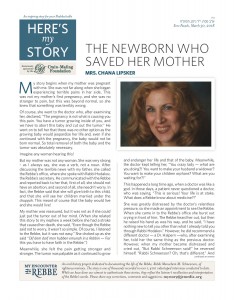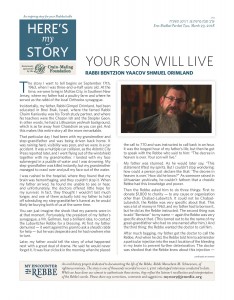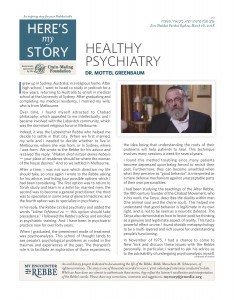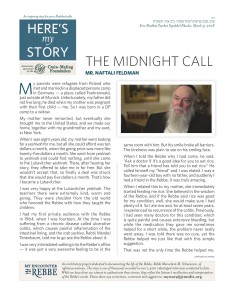The Newborn Who Saved Her Mother
My story begins when my mother was pregnant with me. She was not far along when she began experiencing terrible pains in her side. This was not my mother’s first pregnancy, and she was no stranger to pain, but this was beyond normal, so she knew that something was terribly wrong.
Of course, she went to the doctor who, after examining her, declared, “The pregnancy is not what is causing you this pain. You have a tumor growing inside of you, and we have to abort this baby and cut out the tumor.” He went on to tell her that there was no other option as the growing baby would jeopardize her life and, even if she continued with the pregnancy, the baby would not be born normal. So total removal of both the baby and the tumor was absolutely necessary.
Imagine any woman hearing this!
But my mother was not any woman. She was very strong – as I always say, she was a verb, not a noun. After discussing the terrible news with my father, she called the Rebbe’s office, where she spoke with Rabbi Hodakov, the Rebbe’s secretary. He communicated with the Rebbe and reported back to her that, first of all, she should not have an abortion, and second of all, she needn’t worry. In fact, the Rebbe said that she will give birth to this child, and that she will see her children married under the chuppah. This meant of course that the baby would live and she would live!
My mother was reassured, but it was not as if she could just put the tumor out of her mind. (When she related this story to my nephew a week before she had a stroke that caused her death, she said, “Even though the Rebbe said not to worry, it wasn’t so simple. Of course, I listened to the Rebbe, but it was not easy.” She choked up as she said “Oif dem darf men hubben emunah in a Rebbin – For this you have to have faith in the Rebbe.”)
Meanwhile, she felt the pain getting stronger and stronger. The tumor was palpable as it continued to grow and endanger her life and that of the baby. Meanwhile, the doctor kept telling her, “You crazy lady – what are you doing?! You want to make your husband a widower? You want to make your children orphans? What are you waiting for?!”
This happened a long time ago, when a doctor was like a god. In those days, a patient never questioned a doctor, who was saying, “This is serious! Your life is at stake. What does a Rebbe know about medicine?!” (more…)








